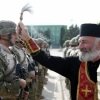NORTH CAUCASUS AND GEORGIA’S NEXUS WITH MILITANT ISLAMISTS
18 July, 2013
 Amir of the Caucasian Islamic Emirate came out with a special statement at the end of June of 2013. He dwelt on suspension of moratorium on carrying out combat operations and clandestine and subversive activities on the entire territory of the Russian Federation. Doku Ummarov declared about his intention to target the 2014 Sochi Olympics as part of the global Jihad (holy war) against not only the Kremlin but also against all so-called Kafirs (infidels).
Amir of the Caucasian Islamic Emirate came out with a special statement at the end of June of 2013. He dwelt on suspension of moratorium on carrying out combat operations and clandestine and subversive activities on the entire territory of the Russian Federation. Doku Ummarov declared about his intention to target the 2014 Sochi Olympics as part of the global Jihad (holy war) against not only the Kremlin but also against all so-called Kafirs (infidels).This declaration must be taken seriously based on a track record of terrorist acts; it should be viewed as a link to the “Al-Qiada” network. Many fail to mention this, as if terrorism in this region is done in isolation. The 2013 Student Olympics held in Kazan, capital of Tatarstan, has already been showcased as an “impregnable” castle, fortified with military faculties. It should be clear that processes in the North Caucasus are important for Georgian national security and the Georgian side should consider the statement as a real threat, at least indirect. This goes beyond a political menace because of the following:
Due to the “Lafankuri Operation” where several Islamist fighters have been killed in a cowardly fashion, when they were intentionally set up to be killed by the authoritarian regime of the former government of Mikheil Saakashvili in collaboration with law enforcement agencies, as if it was the part of a larger cover-up for earlier collaboration. Special force units were tasked with what looks to be more a counterterrorism operation but in fact, it was an operation to make sure that none of the North Caucasian gunmen was left to tell what has transpired between the government and terrorist cells. After the incident, the North Caucasus Islamic Emirate came out on 5 June, 2013, with a special statement, which implied the possibility of revenge in response of those brutal killings. The targets were not the people responsible for those killings but a larger Georgian community. Considering the Emirate’s official declaration, its intention to activate its subversive operations at the global level, it’s logical that Georgia is included in the list of targeted countries.
The terrorist acts were not committed in isolation. There have been a number of incidents which has angered the Georgian Muslim community, who were not allowed to perform religious rituals and ceremonies in some Georgian villages, bordering Azerbaijan. This was perceived as deliberate humiliation of Muslim population; they could even have been deeds of some rogue elements operating on the Georgian territory as a part of the global Jihad. It is interesting to note that one of the pro-Taliban supporter electronic media outlets – Islamic website “ummanews.com” in June and July of 2013 covered those events. The journalists underscored those “problematic issues” – this was the first information of this kind, describing how “In East Georgia Christians don’t allow believers to build Mosques. It was four days after the Georgian military ISAF-led base was attacked by the suicide bombers (Islamist “shahids”). This terrorist act took lives of seven Georgian soldiers, while more than twenty men were wounded. A month later, in the beginning of July of 2013, similar article was published on the same web-site. It is conceivable that the events in Georgia like restricting the religions rights of Muslims could backfire, triggering more attacks in Afghanistan.
This is the worst scenario, and according to the comparative analytical methods, such hypothetical development should be taken into account. However, rising Islamic resistance in the North Caucasus and probable Islamic unrest in the South Caucasus, can be implicated as a possible force that can result in destabilizing the situation, both at the regional level from military and political points of view and fit larger anti-Western and radical Islamic world view.
Moreover, in light of what has happened to the Islamic fighters, who had been invited to Georgia by various security agencies, the statement regarding the threat to the 2014 Sochi Olympics, can deteriorate Georgian-Russian relations for a number of reasons, including the need for military back up and strategic planning on the part of the Russian side. The level of military back up masked under the “Islamic threat”, certainly will strain geopolitical processes for Georgia and Azerbaijan. This comes at a time prior to the Presidential elections in both countries, who have sordid histories of elections, to say nothing about human rights records that rival banana republics.
Consequently, the Georgian government has to be very careful and clear-headed to avoid provocation from any side. Passions that have already reached the boiling point, could be used for any pretext – with devastating impact.













































